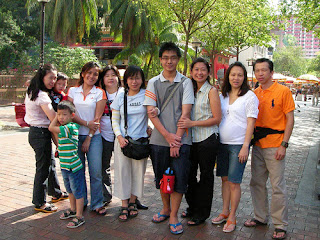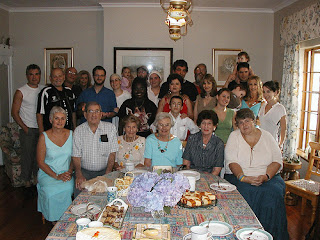
Singapore Skyline


Singaporean Family (extended)
Traditionally both in Singapore and in South Africa the extended family is as important as the nuclear family. Family members are usually very close to one another and they maintain and intedependent unit. However, with the increasing influence of Western values in both cultures is causing a lot of changes to occur.

South African Family (extended)
In Singapore the divorce rate has tripled over two decades from 2313 in 1983 to 6561 in 2003 (http://www.singapore-window.org/sw04/040623a2.htm). Divorce was usually considered to be the last resort however now it is increasingly becoming a norm in Singapore.
I found out from Lauren (one of the students from Vega) that divorces are also common in South Africa. Broken families are an increasing occurrence. When i went on to read discussions in other groups I found out that women and children are highly protected by the government (in terms of laws) in South Africa. This is because of the high crime rates and the domestic violence
cases of the past. When men beat up their wives the government comes to the rescue as though the world has fallen apart. However, there is no real law that protects men from domestic violence. If men complaiend to the police that their women were beating them up then they'd only be laughed at. Hence men leave their families if they cant cope with their committments and leave mothers to raise their own children. Men in South Africa are apparently discouraged from getting married and would prefer being single and true to themselves. They avoid this committment and appear to be changing certain family structures in South Africa.
In Singaporean families the men, usually, are the decision makers. Its clearly a masculine culture however with the advent of tecnology and the modernization of Singapore women are climbing the social ladder. They are taking on equal roles in the corporate real as well as in the domestic realms. they have become income earners and share the responsibilites with men in their families shoulder-to-shoulder. However, there are still several orthodox and conservative families in Singapore that clearly have men leading the families and being looked up to.

In South Africa there seems to be a similar shift in culture from men asserting their power in the families to women asserting their rights. However, in townships (just like in orthodox Singaporean families) the family structure remains traditional and patriarchal.
In terms of independence amongst family members, Laura said that she was the best example. She had already moved away from home with her sister to study at the university. She also said that people usually move out of their homes before they begin their studies or get married and usually move in with their boyfriends/girlfriends before they decide to tie the knot. This was interesting as although it happens in Singapore, it is still a rare and delicate issue (i.e. moving in together with your bf/gf). Families are deeply rooted in their religions and they are very much concerned about their reputations in society hence would not approve of their children moving in with their boyfriend/girlfriend before marriage.
This brings us into the concept of face. In Singaporean families this is a very prominent concept that influences family dynamics. Children must respect their parents to maintain face in society. No member of the family should do something that would make the entire family lose face in society. Respect, honor and positions in society are central to families in Singapore. In certain families it plays out stronger than others.

Asian Face Concept - Mask of Honor
In South Africa, Laura said that even friends are so close to one another that they become part of your "family". Social and familial ties are very important in South Africa hence it seems as though every close relationship you have can in turn be interpreted as familial relationshipsl I found this very interesting as in Singapore friends and family are clearly distinguished and the relationship dynamics are very different amongst both groups.
This is a comical video about how Singaporeans are not aware of the 5 core family values that the government has been promoting:
Hence the perceptions of family in both Singapore and South African youth cultures are somewhat very similar to one another. Both have a traditional background and a group of conservatve families. Both are increasingly influenced by the West and western values which result in divorces and nuclear families being on a rise. However they have certain differences of their own. For example the concept of face in Singapore, friends being a part of families in South Africa, the government protection of women in South Africa influencing families, etc. Hence family is a constantly changing structure precisely because it is influenced by culture which by nature is so fluid.
No comments:
Post a Comment